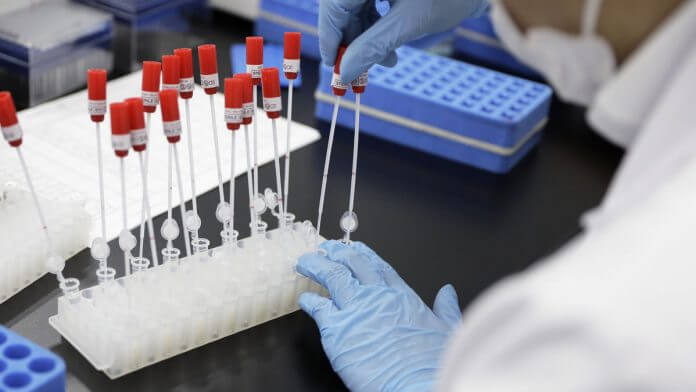Prenatal DNA Test Atlanta provides screening tests for detecting any problem like birth defects or genetic disorders. These screening tests can ensure that whether you need a diagnosis test or not. These screening tests vary according to the time. Read below for information regarding the First Trimester Screening Test:
First Trimester Screening Test
- In this test, Ultrasound and Blood tests are done. In ultrasound, doctors make an image of a baby in the uterus. With the help of this image, a doctor can determine the size and position of a baby. It can detect any abnormality in a Baby’s bones or organs. Nuchal translucency ultrasound is also very helpful in checking the accumulation of fluid at the back of the baby’s neck and is performed between the 11th and 14th week of pregnancy.
- Blood testing is preferred in getting information regarding levels of substances in the blood which provides data on pregnancy-associated plasma protein-A and a hormone called human chorionic gonadotropin. We also can know about blood type and Rh factor by early blood testing procedure.
- CVS Technique is also suggested between the 10th and 12th week of pregnancy to know about chromosomal problems like Down syndrome. Two types of CVS occur; first through the belly which is also called transabdominal and the second through the cervix, known as transcervical.
Contact Facednatest experts for Prenatal DNA testing or type “Prenatal paternity test nears me” and you will find lots of options in your city.
What is first trimester screening?
First-trimester screening evaluates the possibility of chromosomal mutations in the growing child throughout the first phase of pregnancy, which is typically around twelve and fourteen weeks, using a mix of tests such as blood and ultrasonography indicators. It checks for diseases such as Down syndrome. The first-trimester screening blood test results assess the concentrations of two hormones that are associated with the course of pregnancy β-hCG and PAPP-A. To detect any swelling, ultrasound imaging examines the fluid known as translucency of the nuchal area at the rear of the the infant’s neck.
How much does first trimester screening cost?
The price of combined first-trimester screening might vary from $150 to $300 based on the necessity for extra scans, tests, or operations. This is covered by many insurance plans as standard prenatal treatment. The first-trimester screening test is particularly cost-effective when compared to more sophisticated procedures such as DNA extracted from cells and noninvasive prenatal testing (NIPT). Hence when it comes to the straightforward comparison between first trimester screening vs nipt, in terms of cost effectiveness the screening test is more affordable. With a face DNA test starting at $100, pregnant women have an affordable choice.
What blood tests are done during pregnancy?
Early in a pregnancy, the following blood tests are frequently performed:
- your Rh factor and blood type. You could develop antibodies that could harm your fetus if your spouse has Rh-positive blood and yours is Rh-negative. An injectable administered during the 28th week of pregnancy can stop this from happening.
- Low red blood cell count, or anemia
- syphilis, HIV immunity, hepatitis B, chickenpox (varicella), German measles (rubella), and spinal muscular atrophy. Even in cases where there is no family history, healthcare practitioners now frequently offer to screen for these illnesses.
Blood test during pregnancy first trimester?
To check for fetal nuchal translucency using an ultrasound. This first-trimester screening looks at the back of the baby’s neck using ultrasonography. It looks for thicker skin or greater fluid. These might indicate a flaw.
- Blood examinations. Two chemicals that are present in the blood of all pregnant women are measured by the blood tests:
- Plasma protein-A (PAPP-A) is related to pregnancy. Early in pregnancy, the placenta produces this protein. Unusual values may indicate a higher chance of chromosomal abnormalities.
- Chorionic gonadotropin in humans. Early in pregnancy, the placenta produces this hormone. Unusual values may indicate a higher chance of chromosomal abnormalities.
All these blood tests make up for the combined first-trimester screenings.
How accurate is the blood test for Down syndrome?
With a 5% incorrect diagnosis rate, first-trimester screening alone can detect sixty percent of cases of Down syndrome. This implies that even in circumstances when a baby lacks a chromosomal abnormality, a third of Down syndrome cases may go undiagnosed and 5% of mothers may have incorrect findings.
The Face DNA test, one of the more sophisticated cell-free fetal DNA assays, has a better than 99% detection rate for Down syndrome. Therefore, when it comes to the most recent noninvasive prenatal screening, first-trimester screening is not as accurate.
Genetic testing during pregnancy’s first trimester?
Owing to advancements, genetic screening is now possible during the first trimester, while it was previously given between 15 and 20 weeks. With only an ordinary blood sample from the mother, options like the Face DNA test offer early, noninvasive prenatal screening starting as early as 9 weeks of pregnancy. These tests identify over 99% of chromosomal abnormalities without increasing the risk of miscarriage by isolating and analyzing fetal DNA that is not contained in cells in the maternal bloodstream using modern technology.
Choose Clarity with Our DNA Test.
Get Accurate Answers With our Test!.
-
- Accurate
- Quick Result
- Private and Secure
- Affordable

Conclusion
Face IT DNA Technology delivers accessible and cost-effective choices for initial prenatal evaluation during the first trimester, ranging from conventional first-trimester screening to cutting-edge noninvasive DNA assays. Use Face DNA testing, which begins at a low cost, to better understand your risks and make plans. To calm your concerns, make an appointment to talk about the best test.




Leave a Reply
Your email is safe with us.
You must be logged in to post a comment.